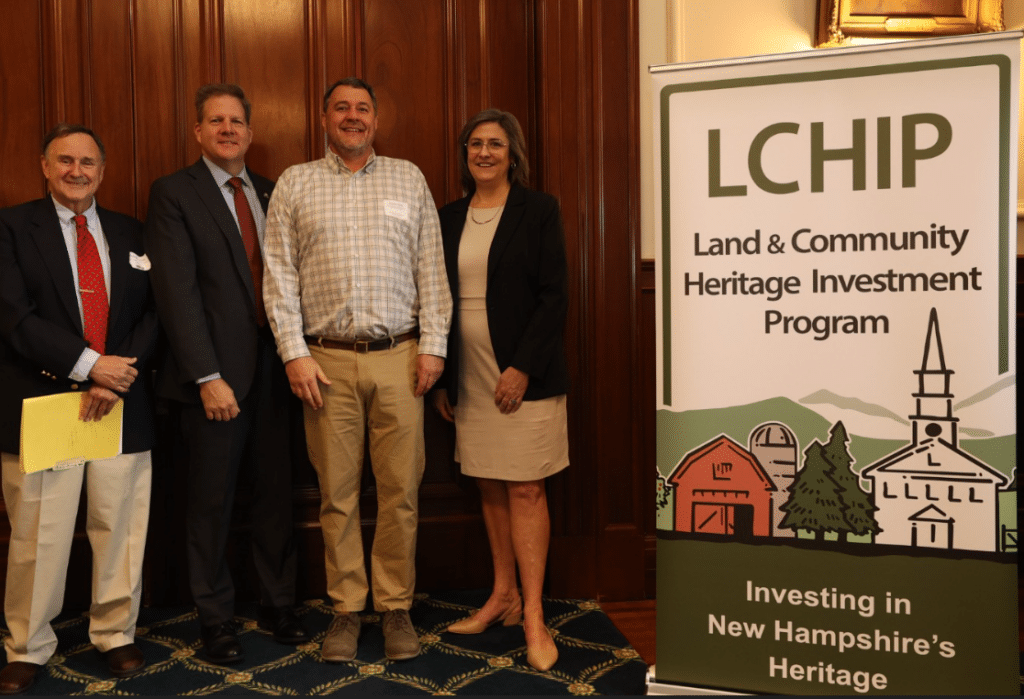NH’s Land and Community Heritage Investment Program (LCHIP) Awards 26 Grants to Communities and Non-Profit Organizations Across the State
Concord, NH. On Monday, December 9th, Governor Sununu joined the New Hampshire Land and Community Heritage Investment Program (LCHIP) today in announcing $3.3 million in matching grants to support twenty-six land conservation and historic preservation projects across the state. The grants will support efforts to rehabilitate 14 historic buildings and permanently conserve more than 3,314 acres of farm, timber, and ecologically significant land in all corners of the state.
The Southeast Land Trust of NH (SELT) received grant awards to support two key conservation initiatives in the New Hampshire coastal watershed: $350,000 for the 100-Acre Woods, the largest privately-owned unconserved tract in Portsmouth, and $250,000 for the 70-acre Mitchell property in Newmarket, a keystone parcel that links nearby conserved lands and provides important wildlife habitat.
The 100-Acre Woods in Portsmouth
Through a partnership with the City of Portsmouth, SELT will acquire a conservation easement on the 100-Acre Woods, located off Elwyn Road in Portsmouth. Landowner Joe Cavaretta agreed to permanently conserve this family land at a reduced sales price. Identified by the City’s Open Space Plan as well as regional conservation plans, the 100-Acre Woods includes prime wetlands that provide pollutant attenuation and flood storage as well as a critical wildlife travel corridor between the Urban Forestry Center and Berry’s Brook.
“We are thrilled that SELT has received this award from LCHIP,” said Deaglan McEachern, Mayor of Portsmouth. “Combined with the City of Portsmouth’s $1 Million contribution from the Conservation Fund, and the funds raised by SELT, the award will enable this partnership to preserve one of our community’s most valuable natural resources. The conservation of the 100-Acre Woods is a once-in-a-lifetime opportunity to protect this irreplaceable habitat, ensure that future generations can enjoy and benefit from this open space, and safeguard the vitality, quality of life, and sense of place that are so important to all who enjoy our City.”
The Mitchell Tract in Newmarket
The Mitchell Tract is a key link in connecting SELT’s Piscassic Greenway to SELT’s Bald Hill Forest, and the larger vision of the Pawtuckaway State Park to Great Bay Greenway. Critical resource values include wildlife habitat for rare and threatened species, water supply protection for Durham/University of New Hampshire drinking water, and scenic views from Bald Hill Road.
“The Town of Newmarket is grateful to the Mitchell family for conserving the land that has been in the family for generations,” said Ellen Snyder, Chair of the Newmarket Conservation Commission. “As highlighted in our 2024 Town Open Space Plan, this property falls within a conservation focus area and will protect Bald Hill (the highest point in Newmarket), significant wetlands harboring rare plants and animals that are part of the Tuttle Swamp ecosystem, fields and stonewalls along the incredibly scenic Bald Hill Road, and opportunities for pedestrian trail connectivity.”
“Conserving this land means the world to us,” says landowner Alan Mitchell. “We inherited this land from our ancestors who settled it in the 1700’s. What better way to honor their labors than to keep it open for all to enjoy.”
The awarded LCHIP grants signify continued momentum for each project, which are slated to be permanently conserved by the fall of 2025. More information on each project can be found at seltnh.org/mitchell and seltnh.org/100acrewoods.
LCHIP grant recipients must match each dollar contributed by LCHIP with at least one added dollar and complete the funded projects according to the program’s rigorous standards. This year’s $3.3 million awards will be matched by more than $9 million from other public and private sources, infusing $12.3 million into the state’s economy through direct project activity.

Pictured: LCHIP’s Board Chair Richard Lewis, Governor Chris Sununu, SELT Conservation Director Duane Hyde, and LCHIP’s Executive Director Paula Bellemore.
